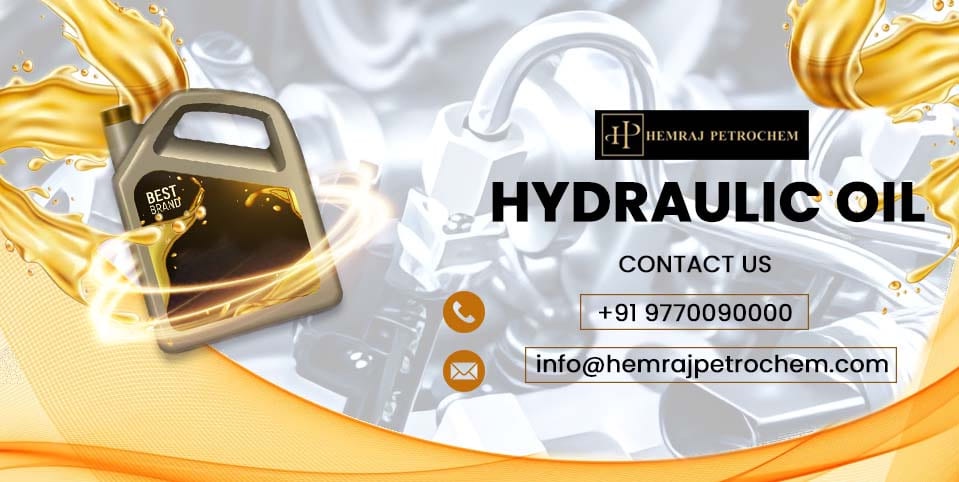Hydraulic systems are essential components in various industries, ranging from automotive to construction, where the efficient transfer of power is crucial. At the heart of these systems lies Hydraulic Oil, a specialized fluid that enables the smooth operation of hydraulic machinery. Understanding its functions, types and best practices is paramount for ensuring optimal performance and longevity of hydraulic systems.
Functions of Hydraulic Oil
Hydraulic oil serves multiple critical functions within hydraulic systems:
-
Transmission of Power: Hydraulic oil sourced from top notch Hydraulic oil Manufacturers transmits power within the hydraulic system by creating pressure, allowing actuators to perform tasks such as lifting heavy loads or operating machinery.
-
Lubrication: It lubricates various moving parts within the system, reducing friction and wear, thus extending the lifespan of components.
-
Heat Dissipation: Hydraulic oil helps in dissipating heat generated during the operation of hydraulic systems preventing overheating and subsequent damage to components.
-
Seal Conditioning: The oil assists in conditioning seals within the system ensuring they remain flexible and effective in preventing leaks.
Types of Hydraulic Oil
Several types of hydraulic oils are available, each designed for specific applications and operating conditions:
-
Mineral Hydraulic Oil: This is the most common type of hydraulic oil, derived from refined crude oil. It offers good lubrication properties and is suitable for general-purpose hydraulic systems.
-
Synthetic Hydraulic Oil: Formulated from synthetic base stocks, these oils offer superior performance in extreme temperatures and harsh operating conditions. They provide enhanced oxidation stability and longer service life compared to mineral oils.
-
Biodegradable Hydraulic Oil: Environmental concerns have led to the development of biodegradable hydraulic oils, which break down naturally over time, reducing environmental impact in case of leaks or spills.
-
Fire-Resistant Hydraulic Oil: In applications where there is a risk of fire, such as steel mills or foundries, fire-resistant hydraulic oils are used to minimize the risk of ignition and subsequent damage.
Best Practices for Hydraulic Oil Maintenance
Proper maintenance of this oil is crucial for ensuring the smooth operation and longevity of hydraulic systems:
-
Regular Oil Analysis: Periodic analysis of hydraulic oil helps in detecting contaminants, degradation, and wear particles early, allowing for timely corrective actions to be taken.
-
Maintaining Proper Oil Levels: Ensure hydraulic systems are filled with the correct amount of oil as per manufacturer recommendations to prevent cavitation and loss of lubrication.
-
Filter Replacement: Regularly replace hydraulic oil filters to remove contaminants and maintain oil cleanliness within the system.
-
Temperature Control: Monitor and control operating temperatures within recommended limits to prevent thermal breakdown of hydraulic oil.
-
Seal Inspection: Regularly inspect seals for signs of wear or damage and replace them as needed to prevent oil leaks and system inefficiencies.
Choosing the Right Hydraulic Oil Manufacturers
When selecting hydraulic oil for your systems, it's essential to choose reputable manufacturers who prioritize quality and performance. Look for manufacturers with a proven track record of producing high-quality hydraulic oils that meet industry standards and specifications.
Similarly, when considering suppliers for Shuttering Oil, ensure they offer products specifically designed for the intended application, with emphasis on performance, safety, and environmental considerations.
Conclusion
In conclusion, understanding the functions, types, and best practices associated with Hydraulic Oil is essential for maintaining the efficiency and longevity of hydraulic systems. Whether it's selecting the right type of oil for your application, implementing proper maintenance procedures, or choosing reliable manufacturers and suppliers, attention to detail is key. By following the guidelines outlined in this guide, you can ensure optimal performance and reliability of your hydraulic systems. Remember, for high-quality hydraulic and shuttering oils, trust only the best – Hemraj Petrochem.


No comments yet